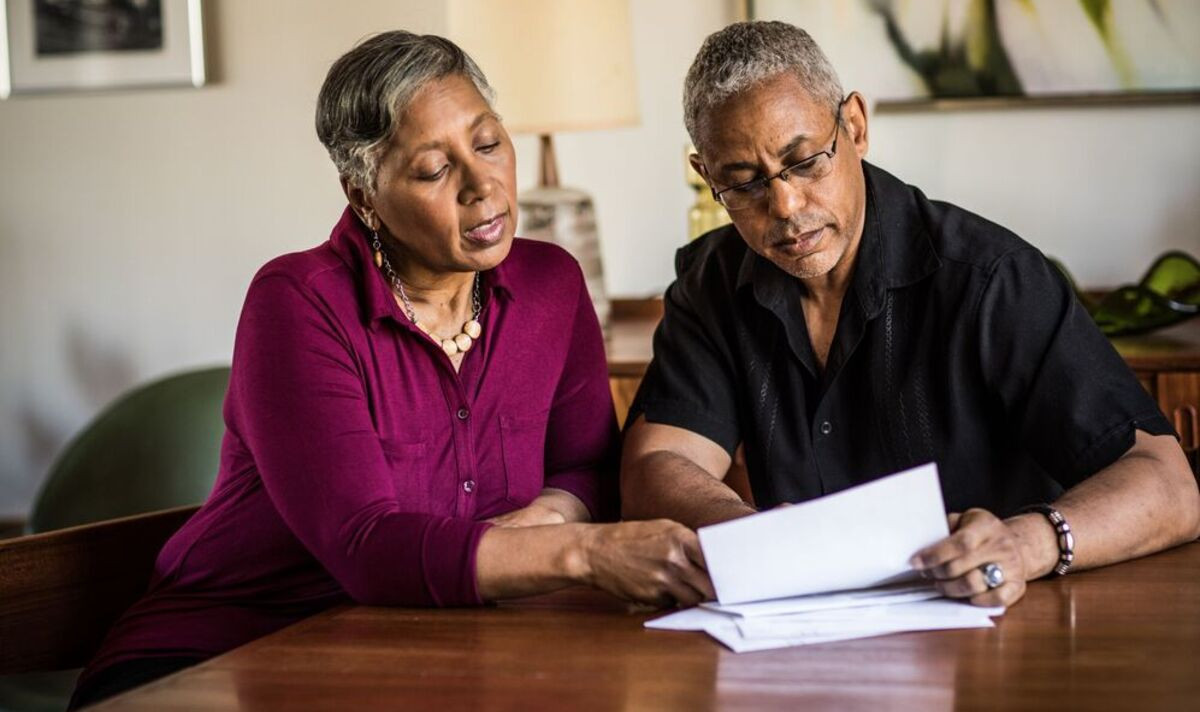Hundreds of thousands of pensioners have been urged to claim a pension top-up that will enable them to beat government cuts in energy bill support. An estimated 880,000 low-income pensioner households eligible for pension credit currently fail to claim it and a deadline is approaching.
The government says it is worth an average of £3,900 a year, but it also a gateway to other financial support such as winter fuel payments. Ministers have launched a pension credit publicity campaign to minimise the impact of the government’s decision to radically restrict winter fuel payments.
Last month the chancellor, Rachel Reeves, introduced a means test for the winter fuel payments, which have been a universal benefit available to all pensioners since 1997, so that only those on pension credit would qualify, as part of the “difficult decisions” she had to make having inherited a “dire state of public finances” from the Conservatives. Reeves insists the government’s commitment to support pensioners remains, and cited the maintenance of the triple lock as an example of this.
But the government has faced mounting criticism and calls for the means-testing to be reversed, amid warnings Reeves’s move could risk millions of pensioners being forced to choose between eating a hot meal or turning the heating on this winter. More than 370,000 people have signed Age UK’s petition alone, calling on the government to save the winter fuel payment which was cut, the charity says, “with virtually no notice and no compensatory measures to protect poor and vulnerable pensioners”.
The impact of Reeves’s move are twofold. While government estimates are that 1.3 million households across England and Wales will continue to receive their winter fuel payments, analysis revealed earlier this month indicated about 130,000 people would miss out in the UK because they are up to £500 a year over the threshold for receiving pension credit, making them ineligible for the support. Analysts warned those people might end up worse off than some of those who qualified for the payment. Additionally, campaigners have warned the pension triple lock would not be enough to offset the loss of the winter fuel payment.
While campaigners have estimated that about 850,000 pensioners are eligible for pension credit in the UK but are not claiming it, the government estimates this figure is higher and closer to 880,000. Angela Rayner, the deputy prime minister, and Liz Kendall, the work and pensions secretary, are writing to local authorities and will join forces with them, older people’s charities and other groups this September for the annual pension credit week of action. The government hopes its pension credit awareness drive will help identify households not claiming the benefit and encourage pensioners to apply by 21 December, which is the last date this year for people to make a backdated claim for pension credit in order to receive the winter fuel payment.
Officials hope the awareness drive in September will also tackle some of the myths that may stop people applying, such as how having savings, a pension or owning a home are not necessarily barriers to receiving pension credit. Over the next five years over 12 million pensioners will see their state pension increase by thousands of pounds as a result of the commitment to the triple lock. And the warm homes plan will support investment in insulation and low carbon heating – upgrading millions of homes over this parliament.
Liz Kendall, the work and pensions secretary, said: “The £22bn black hole in the public finances we have inherited has required us to take difficult decisions, but I am determined to ensure low-income pensioners are supported. That’s why I urge any pensioner, or their loved ones, to check if they could get pension credit. This government remains completely committed to pensioners which is why we’re protecting the income of over 12 million pensioners through the triple lock.”
The energy secretary, Ed Miliband, added: “Everyone has paid the price for over a decade of energy insecurity, which is why we are getting on with delivering clean power by 2030, alongside our ambitious warm homes plan. It is imperative that those eligible get the support they need this winter, which is why government will do everything it can to roll out pension credit, making sure as many people as possible qualify for the up to £300 winter fuel payment.”
Previously the tax-free benefit was available to everyone above state pension age, but now it will be limited to people over state pension age who are receiving pension credit or other means-tested support. Pensioners are being urged to check if they are eligible for the winter fuel allowance after universal payments were scrapped. Last month Chancellor Rachel Reeves said that the tax free benefit, to help older people with higher heating costs during the colder months, would be limited to those on pension credit.
The surprise move was part of efforts to plug a £22bn hole in the public finances which Labour accused the Conservatives of “covering up” during their time in office. Today the new government is launching a drive to make people aware of the changes, amid concern that hundreds of thousands of eligible pensioners are yet to claim. Previously, the money was available to everyone above state pension age, but now it will be limited to people over state pension age who are receiving pension credit or other means-tested support. It means the number of people entitled to the money will drop from 11.4 million to just 1.5 million. The payment is £200 for households where the recipients are all under 80, and £300 where they are over 80.
While around 1.4 million pensioners are already receiving pension credit, there are up to an estimated 880,000 households eligible for the support who are yet to claim, the Department for Work and Pensions said. The government's awareness drive will help identify households not claiming the benefit, and encourage pensioners to apply by 21 December - the last date for making a backdated claim for pension credit in order to receive the Winter Fuel Payment. It will focus on “myths” that may stop people applying, such as how having savings, a pension or owning a home are not necessarily barriers to receiving pension credit. The awareness drive comes after experts warned the average household energy bill is set to rise by £146 in October, the latest increase since the Russian invasion of Ukraine triggered a global energy crisis.
Defending the cuts, Ms Reeves repeated that the “dire state of the public finances” inherited from the Tories meant making “some very difficult decisions”, and that the government was supporting pensioners by maintaining the triple lock. But Laura Trott, the shadow chief secretary to the Treasury, said the plans would “increase pensioner poverty” as she accused ministers of “acquiescing to every union demand” in light of recent strike negotiations. “Instead of desperately trying to mitigate the impact of their own decisions, the Chancellor should come clean and publish the internal impact assessment so the public can truly see the damage of this policy,” Ms Trott said. The Government has launched a Pension Credit awareness drive to encourage pensioners who are not claiming the benefit to apply and make a backdated claim by 21 December to receive the Winter Fuel Payment. Chancellor Rachel Reeves announced last month that most pensioners, except those on Pension Credit, will not receive winter fuel payments this winter which can be worth up to £300 annually, depending on age and household circumstances.
This could potentially impact around 880,000 households that are eligible but are yet to claim. It aligns with research by HUB Financial Solutions of more than 1,000 over-65s which found that 38 per cent of homeowners had never checked if they were entitled to extra benefits, more than double the proportion of those renting which is at 15 per cent. Additionally, only 20 per cent of homeowners said that they had checked their eligibility for benefits in the last year, compared to 41 per cent of renters. Meanwhile, according to research from Just Group, 9 per cent were claiming but receiving less than what they were entitled to and missing out on an additional £476 a year income. HUB Financial Solutions head of customer solutions and advisory leader Matt Halksworth says: “While inflation may be coming down, many pensioners will still have seen their budgets squeezed over the past few years. And the recent announcement by the Chancellor to limit winter fuel payments to those on pension credit or other means-tested benefits underlines how important it is for people to check their eligibility. However, our research suggests many homeowners are not even checking to see if they could be entitled to valuable financial support from the government. It suggests that many pensioners may think that owning a home could exclude them from benefits such as Pension Credit.”
A backlash has been steadily growing since Rachel Reeves announced the scrapping of the winter fuel allowance a fortnight ago. Currently, all 11.4 million pensioners receive an extra £200 to help heat their homes every winter, with those over 80 receiving a blanket £300 payment. Under Reeves’ plans, only those receiving pension credit or other means-tested benefits will be eligible for the additional support. It is aimed at saving £1.4 billion for the Treasury’s coffers as part of Labour’s attempts to fill the supposed £21.9 billion ‘black hole’ left by the Sunak government. There is certainly a strong case for asking whether the payments should exist in their current form. The introduction of the winter fuel allowance by Gordon Brown in 1997 was before the triple lock, the era of low interest rates and the asset boom of the past twenty years. Back then, pensioner income was 30 per cent lower than that of workers; now it is closer to 10 per cent. One in four is now regarded as a millionaire, thanks to a near-quadrupling over the past decade.
Reeves is asking for pensioners to take less from the state, while giving certain sectors more. Train drivers have been given a rise of 14 per cent over three years; junior doctors offered a 22 per cent increase over two years. Both Louise Haigh, the Transport Secretary, and Wes Streeting, the Health Minister, have said they are ‘delighted’ with the settlements. The risk for Labour is the impression that ministers are happy to talk of selflessness and sacrifice while rewarding voters and unions who comprise their base. Unsurprisingly, the move has found little favour among the nearly 10 million pensioners who will be left worse off by this change. Mindful of their aging voter base, the Tories have now jumped on the story. All six leadership contenders today are urging Reeves to U-turn, with Priti Patel dubbing the move ‘shameless and cruel’. James Cleverly suggests the Chancellor has no ‘democratic mandate’ for ‘a change like this’ while Robert Jenrick accuses Labour of ‘breathtaking hypocrisy’ given Starmer’s comments in opposition. The Liberal Democrats are against it too, with Ed Davey branding the move ‘crazy’ and ‘very ill-advised’. Polling on the issue is split but there are warning signs for the government. Half of Fleet Street has now rowed in, pointing out that MPs can put their office heating bills on expenses. Martin Lewis, that scourge of successive Treasury ministers, says the benefit is ‘being squeezed to too narrow a group’ with ‘those just above the thresholds’ being ‘hardest hit’. Several Labour MPs admit they are surprised at the volume of correspondence triggered by the move. It has prompted speculation that Reeves will return to the issue in her first Budget on 30 October.
The row over winter fuel payments therefore offers us a good test of Reeves’ mettle. Voters often forget tax rises which take place at the beginning of a parliament: George Osborne’s 2010 VAT hike being no barrier to a Tory triumph five years later. But removing tangible benefits from a politically switched-on group may prove more problematic than Reeves and her team first imagined.


















